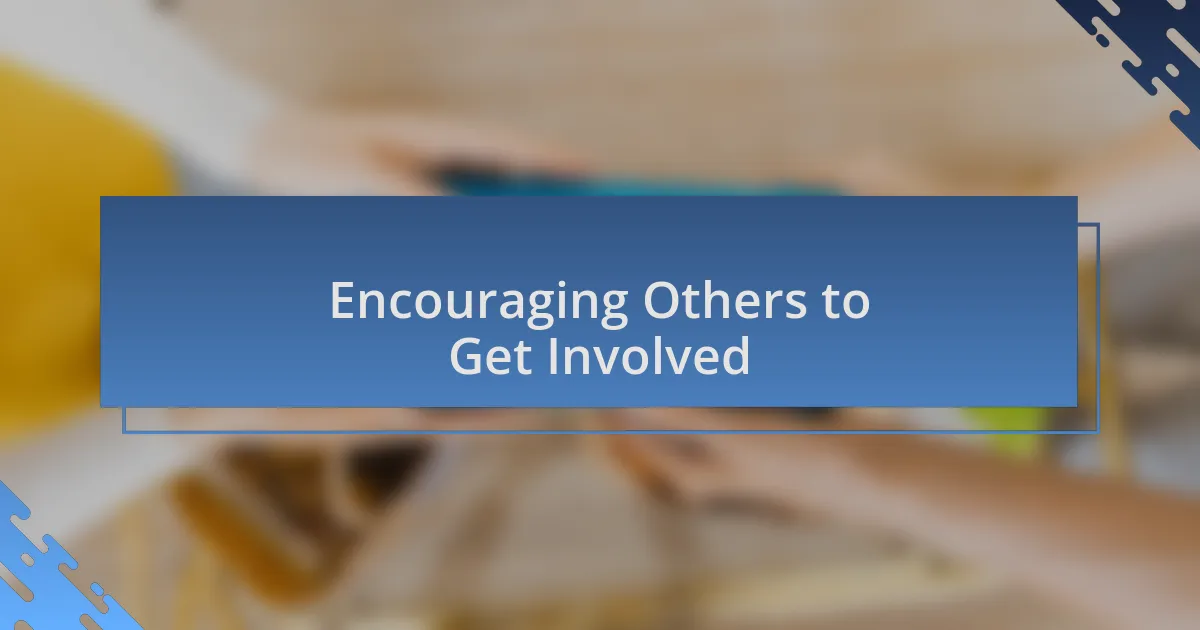Key takeaways:
- Homeless charity extends beyond immediate aid, focusing on building connections and long-term solutions for individuals facing homelessness.
- Food pantries serve not only as food distribution centers but also as community hubs, fostering a sense of belonging and providing resources for empowerment.
- Volunteering cultivates empathy and teaches valuable lessons in flexibility, resourcefulness, and the mutual benefits of giving and receiving support.
- Encouraging others to volunteer can spark awareness of community issues and lead to transformative experiences for both helpers and those in need.

Understanding Homeless Charity
Homeless charity encompasses a broad spectrum of services aimed at supporting individuals facing homelessness. From shelters to food pantries, these initiatives are designed not just to provide immediate relief but also to foster long-term solutions. I often wonder: what truly motivates someone to step up and contribute to this mission? I’ve seen firsthand how a simple meal can restore hope to someone who feels invisible.
Many people often think of charity as just giving, but it’s much deeper than that. It’s about connection, understanding, and compassion. I remember volunteering at a local pantry where I met a man named Ben. He shared his story of job loss and the struggle to keep his family together. It struck me how easily this could happen to any of us, reminding me that homelessness is not just a statistic; it’s a reality for many.
The impact of these charitable efforts goes beyond just providing food or shelter. They help to build supportive communities. Being part of these initiatives, I’ve learned that listening and empathy are just as critical as the resources we offer. When we engage with individuals and truly hear their stories, we pave the way for deeper connections and potential pathways out of homelessness. Isn’t it this human connection that can truly change lives?

Importance of Food Pantries
Food pantries play a crucial role in addressing food insecurity, especially for those experiencing homelessness. I recall a day in the pantry when a mother walked in, visibly stressed and worried about feeding her children. When she left with bags full of groceries, there was a glimmer of relief in her eyes; it made me realize how essential these resources are for restoring dignity and hope in difficult times.
In my experience, food pantries do more than just distribute meals; they serve as community hubs where individuals can access additional resources. One Saturday, I noticed a group of volunteers offering guidance on job applications and financial literacy. This multifaceted approach not only fills stomachs but also uplifts spirits and provides the tools necessary for rebuilding lives. Isn’t it powerful to consider that a bowl of soup can be a stepping stone towards a stable future?
Moreover, the act of receiving food from a pantry brings a sense of belonging to those who might otherwise feel isolated. I remember chatting with a young woman who frequented our local pantry. She expressed how the friendly faces and warm conversations made her feel like part of a community. It struck me that food, while vital for survival, also nourishes our sense of connection and shared humanity. Isn’t it this bond that we should strive to create in every effort we extend towards supporting those in need?

How Food Pantries Work
Food pantries typically operate by sourcing food donations from various community members, local grocery stores, and farmers. I remember one time we organized a food drive at my workplace. The logistics were challenging, but seeing boxes overflowing with canned goods and fresh produce felt uplifting. It demonstrated the power of community collaboration in ensuring that food gets to those who need it most.
Once the food is collected, volunteers sort, organize, and bag items to prepare for distribution. My first day volunteering in the pantry was eye-opening; I was struck by how efficiently the team worked together, each person knowing their role. It made me think, how often do we take for granted the organization behind these charitable efforts? This teamwork ensures that clients can quickly receive the essentials they need, creating a supportive atmosphere during what may be a vulnerable moment for them.
Finally, individuals can access these food resources through a simple process, often requiring only a form of identification or proof of need. Although some may worry about the stigma of seeking help, I’ve seen firsthand how uplifting it is for clients to walk away with bags of food, full of nutritional options. Hasn’t the experience of being welcomed and served with kindness fostered a sense of empowerment for those relying on food pantries? It’s about making connections that reinforce dignity and boost self-esteem during tough times.

Lessons Learned from Volunteering
Volunteering in food pantries has taught me the immense value of empathy. There was one instance when I spoke with a single mother who was new to the program. As she shared her struggles, I felt a wave of understanding wash over me. It made me realize how important it is for us to listen and offer more than just food – a kind word or a smile can mean the world to someone in need.
Another lesson I gathered from my time at the pantry is the importance of flexibility and resourcefulness. I remember a day when we unexpectedly ran low on supplies, but the team quickly brainstormed ways to make do with what we had. This taught me that challenges can spark creativity and collaboration. Have you ever faced a situation that seemed daunting but led to innovative solutions? In such moments, I found a sense of unity in our shared purpose.
Lastly, I learned that the act of giving can create a profound sense of fulfillment. One day, as I handed out grocery bags to clients, I noticed the smiles on their faces. It struck me that these small acts of kindness can uplift both the giver and the receiver. Isn’t it incredible how such simple gestures can create ripples of positive change? It’s a powerful reminder that, behind every canned good, there’s a story of resilience and hope.

Encouraging Others to Get Involved
Getting involved in food pantries can be a transformative experience, not just for those receiving assistance, but for the volunteers as well. I remember the first time I encouraged a friend to join me. She was hesitant, fearing she wouldn’t know what to do. But once she stepped in the door and saw the smiles of those we served, her apprehension faded. Isn’t it amazing how stepping out of our comfort zones can lead to unexpected joy?
There’s something powerful about sharing the simple act of helping. I often invite colleagues to volunteer days, and I see them connect with the people we assist in ways they never anticipated. One colleague told me how serving meals made her more aware of food insecurity in our community, and it compelled her to take further action outside of the pantry. Have you ever had a moment where you realized your actions could spark broader change? That realization can be a catalyst for ongoing involvement.
If you’re considering volunteering, I encourage you to take that leap. The stories you’ll hear and the connections you’ll make can alter the course of your life in the best possible way. Reflect on this: what if your participation not only changes someone else’s day but also enriches your own perspective on gratitude and community? Being part of a food pantry can be an eye-opening journey, one that deepens our understanding of humanity.